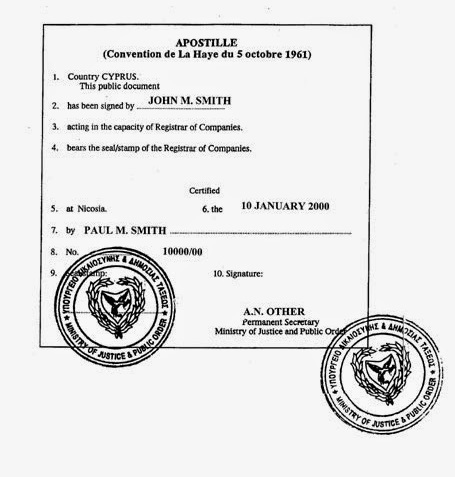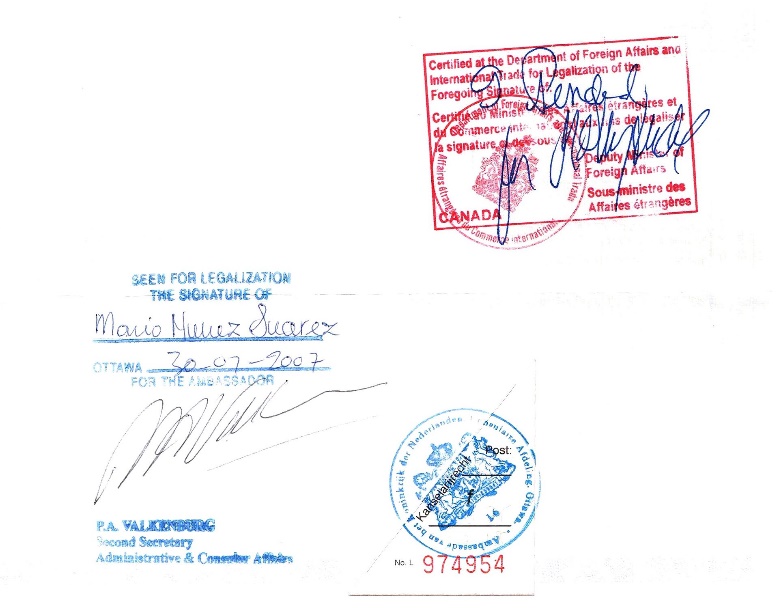How it works
What is an apostille?
Apostille is a verification certificate that proves the authenticity of an original public document and is issued by the states which are contracting parties to the Apostille Convention. Based on such certificate, the authorities of a foreign state will consider the apostilled documents as legitimate.
The apostillation of a document essentially consists of one formal act, i.e. providing the verified document with verification certificate – apostille. The further verification of the document by any state authorities is not necessary. Therefore, apostillation process is easier and quicker than document legalisation.
Given that the apostille is issued in Czech language, it is necessary to procure the translation of the apostilled document into the language of the state in which the apostilled document is to be used.
For detailed information, please read the section “FAQ”.
Please note that we arrange the apostillation of documents issued exclusively by the Czech authorities or institutions.
Apostille Convention
Detailed information related to the Apostille Convention is available here.
How does an apostilled document look like?

List of states under the Apostille Convention
- Albania
- Andorra
- Antigua and Barbuda
- Argentina
- Armenia
- Australia
- Austria
- Azerbaijan
- Bahamas
- Bahrain
- Barbados
- Belarus
- Belgium
- Belize
- Bolivia
- Bosnia and Herzegovina
- Botswana
- Brazil
- Brunei Darussalam
- Bulgaria
- Burundi
- Cape Verde
- Chile
- China, People´s Republic of (Hong Kong & Macao Only)
- Colombia
- Cook Islands
- Costa Rica
- Croatia
- Cyprus
- Czech Republic
- Denmark
- Dominica
- Dominican Republic
- Ecuador
- El Salvador
- Estonia
- Fiji
- Finland
- France
- Georgia
- Germany
- Greece
- Grenada
- Guatemala
- Guyana
- Honduras
- Hungary
- Iceland
- India
- Ireland
- Israel
- Italy
- Jamaica
- Japan
- Kazakhstan
- Korea, Republic of
- Kosovo
- Kyrgyzstan
- Latvia
- Lesotho
- Liberia
- Liechtenstein
- Lithuania
- Luxembourg
- Malawi
- Malta
- Marshall Islands
- Mauritius
- Mexico
- Moldova, Republic of
- Monaco
- Mongolia
- Montenegro
- Morocco
- Namibia
- Netherlands
- New Zealand
- Nicaragua
- Niue
- North Macedonia, Republic of
- Norway
- Oman
- Panama
- Paraguay
- Peru
- Philippines
- Poland
- Portugal
- Romania
- Russian Federation
- Saint Kitts and Nevis
- Saint Lucia
- Saint Vincent and the Grenadines
- Samoa
- San Marino
- Sao Tome and Principe
- Serbia
- Seychelles
- Slovakia
- Slovenia
- South Africa
- Spain
- Suriname
- Swaziland
- Sweden
- Switzerland
- Tajikistan
- Tonga
- Trinidad and Tobago
- Tunisia
- Turkey
- Ukraine
- United Kingdom of Great Britain and Northern Ireland
- United States of America
- Uruguay
- Uzbekistan
- Vanuatu
- Venezuela
Legalisation
What is legalisation?
Legalisation, sometimes called superlegalization, is the process of authenticating or certifying a legal document so a foreign country's legal system will recognize it as with full legal effect. This type of certification is used by commities which are not member to Apostille Convention.
The process of verification of documents may vary, depending on the countries. The differences arise for example in relation to the verification of translations, translations itself, etc.
In practice, legalisation generally means that the document is subsequently verified by:
- the central state administration authority superior to the authority which issued the document
- the respective superior state administration authority of the Ministry of Foreign Affairs
- the diplomatic or consular authority of the state in which the document is going to be used.
For detailed information, please read the section “FAQ”.
Please note that we arrange the legalisation of documents issued exclusively by Czech authorities or institutions.
How does a legalised document look like?

States that require legalisation of documents
- Algeria
- Afghanistan
- Angola
- Bangladesh
- Benin
- Burkina Faso
- Cambodia
- Cameroon
- Canada
- Chad
- China
- Congo
- Cuba
- Egypt
- Eritrea
- Ethiopia
- Ghana
- Guinea
- Haiti
- Indonesia
- Iraq
- Iran
- Ivory coast
- Jordan
- Kenya
- Kuwait
- Laos
- Lebanon
- Libya
- Madagascar
- Malaysia
- Mali
- Mauritania
- Myanmar
- Nepal
- Niger
- Nigeria
- Pakistan
- Palestine
- Qatar
- Rwanda
- Saudi Arabia
- Senegal
- Sierra Leone
- Sri Lanka
- Sudan
- Syria
- Taiwan
- United Republic of Tanzania
- Thailand
- Turkmenistan
- United Arab Emirates
- Uganda
- Vietnam
- Yemen
- Zambia
- Zimbabwe